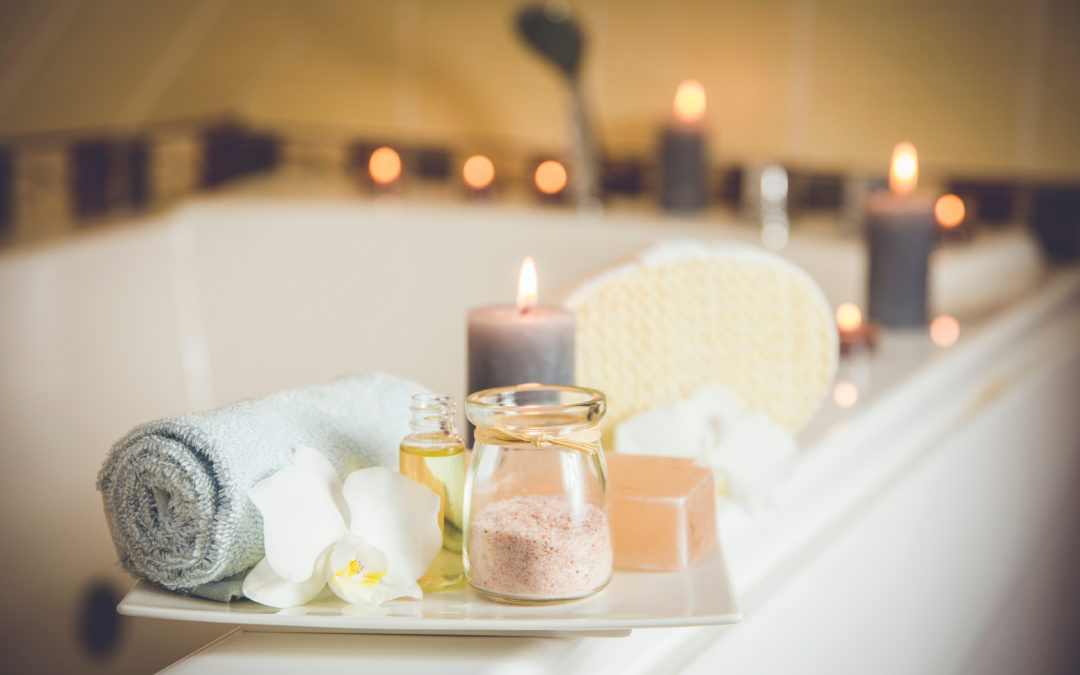
by mobilityplus | 21st Sep, 2021 | Blog, Inspiration
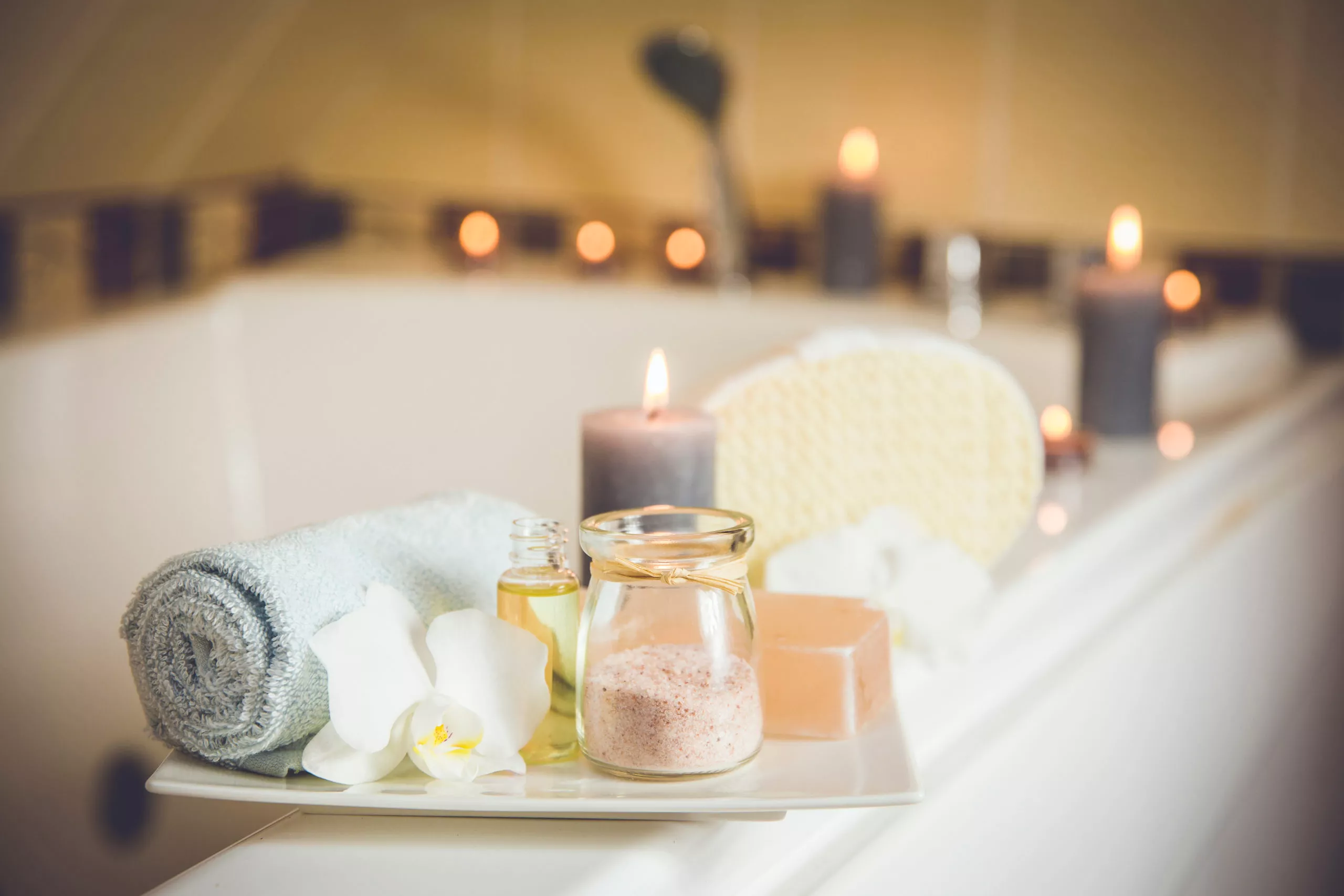
Self-care has never been more important. It’s crucial to make time for yourself and to do things that will help you unwind.
Having a bath is that time in your day to switch off from the outside world, disconnect from your working day and have the quality time that you deserve.
Running the perfect bath is something you can easily master to make your evenings (or mornings) more relaxing than ever.
If you’re full of questions about bath time or looking for some tips to maximise your experience, here is our step-by-step guide on how to run the perfect bath.
1. Setting the mood in the bathroom
Creating the perfect bath isn’t just about what goes in the bath, it’s how you set the surrounding ambience.
Relaxation is all about energy and feeling relaxed physically and mentally, that by setting a chill mood, it’ll help aid you into the ultimate relaxation experience.
Start by dimming the lighting (if your bathroom has that feature) or instead lighting a few candles to minimise the brightness of the day and trick your brain into a bedtime mindset.
Then, if you’re feeling fancy, scatter some rose petals and spritz some calming spray into the air. It’ll add to the overall effect of the room.
2. Getting the water temperature just right
Some people love a piping hot bath, others prefer it colder but for the best bath, warm water is the way forward.
If the water is too hot, it can lead to sweating, feeling uncomfortable and drying the skin out.
Whereas, although cold water does have its benefits including stimulating the immune system, promoting good blood circulation and helping calm dry and itchy skin, it’s not the best way to relax.
We’d recommend a running a warm bath – warm water is different for everyone so the best way to test it is the old school trick for babies: dip your elbow in the bath and if you feel that the temperature is comfortable and not making you flinch, it’s ready.
3. Adding in relaxing bath products
The world of bath products has blown up in recent years, with many things to choose from including bath bombs, bath salts and bath oils – that it can be hard to know where to start.
The first thing we’d suggest is to throw in a scoop of epsom salts. Epsom offers a whole range of benefits including reducing inflammation and relieving joint pain.
As the salts are your base, the next fun step is to add in bubbles. It can’t be a bath without bubbles, right?
For the ultimate bubble experience, run the bubble bath under a running tap as they’ll lather up rather nicely.
Then, it’s onto oil. You can either opt for a bath oil or an essential oil. Essential oils such as lavender are a brilliant way to add a subtle scent to your bath and depending on the oil, have a positive effect on the calm feel of the bath.
Lavender in particular is great for putting you in a sleepy mood but chamomile and rose are great options too.
Bath oils have a similar experience to essential oils, however, are a better option if you’d like a hydration effect on the skin, especially as hot water can dehydrate the skin.
4. Utilising your luxury skincare
Bath time is ideal to jump into your basket of skincare and the products you don’t use often enough.
It’ll not only increase the spa experience but do wonders for your calm state of mind. We’d suggest popping on a face mask, whichever kind you prefer for 10 minutes or so and then washing it off with a warm hot cloth.
Not only will it be relaxing, but a blessing to your pores.
5. Using a comfy bath pillow
Lying down in a bath isn’t exactly the most comfortable thing, however, with a bath pillow, your comfort levels will go up 100%.
If you don’t have a pillow to hand, you can always roll up a towel and lie on it to give your neck the support it needs.
6. Preparing relaxing activities
Baths can vary in length in time for everyone, some love a quick dip, whereas others can be in there for hours.
If you’re a longer kind of bather, then activities are an essential part of your bath routine.
Whether it’s reading a book, putting on some chill music, listening to a podcast or bringing your laptop in and watching your favourite TV show, there are many ways to keep entertained whilst relaxing.
7. Switching off all distractions
Having a bath is your time and that means getting rid of all distractions.
Leave your phone in your bedroom and switch off anything that’ll sway you away from feeling any ounce of relaxation.
If you live with your partner or have kids, let them know not to distract you or prepare something to keep them entertained whilst you bathe.
8. Preparing drinks and snacks
To step up the ultimate bath, drinks and snacks are a great addition.
Pour your favourite glass of wine and bring along a bar of your favourite chocolate for pure indulgence. It’s your time after all.
9. Laying out comfy clothes for afterwards
Once you step out of the bath, the warm sensation can leave you quite quick, so it’s always best to lay out comfy clothes.
This could be your favourite pyjamas, a dressing gown and fluffy socks, to maintain the level of joy across your skin.
10. Continuing the relaxation in your day
Relaxation shouldn’t stop when you step out of the bath. Once you’re in that mindset, it’s important to stay there so you’re able to unwind and go to sleep easily.
We would suggest having a slow evening after your bath, slathering your skin in moisturiser, dipping into a good book and journaling away before your head hits the pillow.
Running a great bath couldn’t be easier and is a luxury we all deserve once in a while. If you’re looking for walk-in baths and walk-in showers, take a look at our range online today.

by mobilityplus | 10th Dec, 2020 | Inspiration
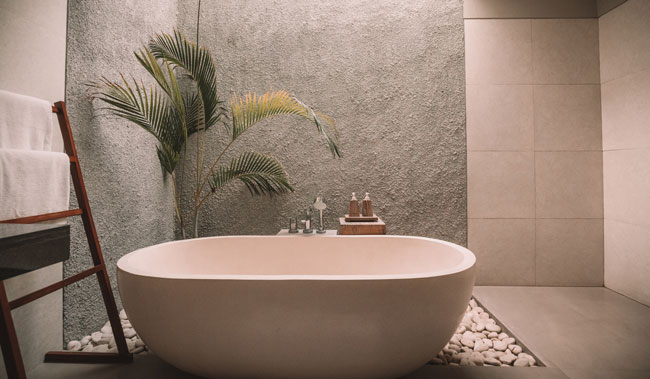
Typically, bathrooms have limited space, meaning that you can’t fill them with all the decorations that you love as comprehensively as you can in other parts of your home. Of course, where the permanent fixtures, like showers, are placed makes a massive difference. However, there are always ways to bring life into your small bathroom in new and innovative ways.
One such way to brighten up your bathroom space is by decorating it with plants that specifically suit your space. Plants are a great asset to any room, not only bathrooms, because they look delightful but also oxygenate the room. Studies have shown that having plants boosts your mood and reduces stress levels, alongside other benefits.
It can be tricky to find a plant that thrives in a small bathroom, due to low light and high humidity. That’s where small artificial plants for the bedroom can also come in handy! Real or fake, here’s your introduction to a few plant friends that will be a great fit for your bathroom.
1. Spider Plant
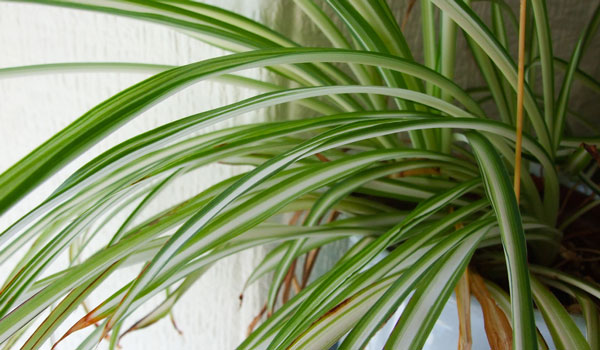
Our first recommendation for a small bathroom is the spider plant. Spider plants are known for growing rather quickly, and even have NASA’s seal of approval. The research that NASA conducted showed that spider plants can remove up to 90 percent of the toxins from the air in your bathroom in just two days.
If you’re prone to allergies, this is an excellent way of clearing the air. This plant is best kept near a window. Additionally, It’s best to avoid placing the plant on a radiator as it will lose its hydration.
Request a Free Brochure
Simply fill out a quick form and see how we can transform the way you bathe.
Request Free Brochure
2. Dracaena

This pretty plant is perfect for your small bathroom, and is a popular choice to help reduce the humidity in the room., Also available as a small artificial bathroom option, the Dracaena plant also reduces dust and regulates the humidity in your home by releasing moisture.
Did you know that research has shown that indoor air can be 12 times more polluted than the air outside in some areas?
This is mainly due to the materials and chemicals used in furnishings, paints, and clothing becoming airborne. However, the dracaena plant can eliminate the pollutants, making breathing easier, help fight colds, remove airborne contaminants, and improve overall health. Be aware that this plant isn’t animal-friendly, though, so keep it out of the reach of any animals you have.
3. Snake plant

The snake plant is perfectly suited to the bathroom, big or small. Inexpensive and low-maintenance, this plant should be in your bathroom as it converts CO2 into oxygen at night. It’s easy to leave this plant to its own devices, as it is used to being in several different climate conditions.
Even if you forget to water it for a few weeks, it will still flourish. The best spot for this small bathroom plant is anywhere where there is direct sunlight and occasional fresh air – so a bathroom window works perfectly.
If you’re a frequent traveller, this plant would be your best buy as it doesn’t mind missing you for a while! Choose this plant for your bathroom and you won’t be disappointed.
4. Aloe Vera
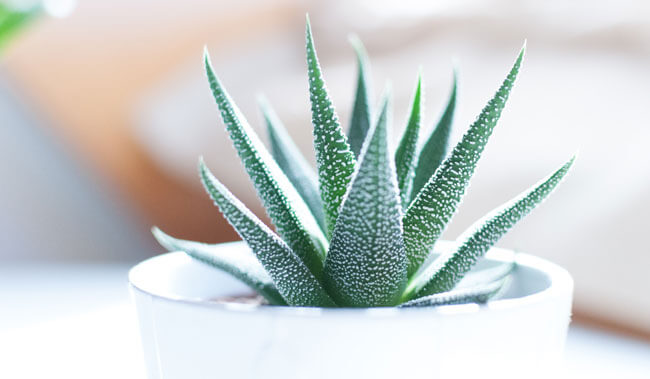
Not only is this plant low maintenance, but it also reproduces effortlessly. Aloe vera is also a great multipurpose plant; as you can treat minor cuts and burns from the gel in the leaves.
Making this miracle plant not only ideal for small bathroom decor but anywhere in the home.
Aloe vera is happiest close to a window, but not in direct sunlight. It’s perfectly suited for the bathroom, as it doesn’t need a lot of water to survive, so the humidity should be enough to keep it going.
5. Chinese Evergreen
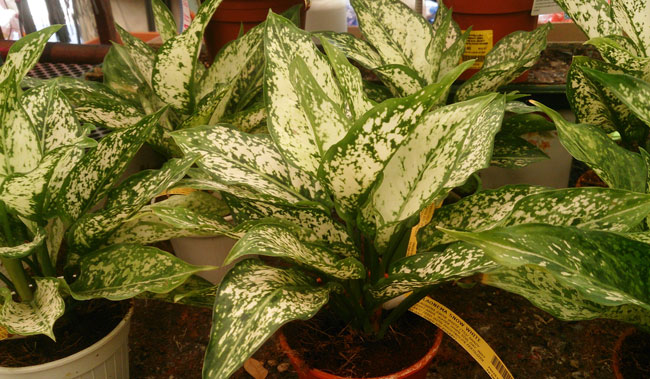
The Chinese Evergreen is absolutely stunning plant, with leaves are streaked with white or yellow. It’s also one of the most low-maintenance plants you can have in the home. It thrives in medium to low light, or indirect sunlight, and loves humid conditions.
Although the humidity should be enough to keep this plant going, you can also spray the leaves to keep it hydrated if it’s looking a little bit worse for wear. Take care of this beauty, and it’ll take care of you and keep your small bathroom looking stylish.
6. Orchid

Orchids are an absolute beauty to look at and are a wonderful plant to add to your small bathroom – providing an often much needed pop of colour.
Orchids are naturally derived from humid, tropical rainforests and, therefore, bathrooms are often a great substitute. The warm, steamy atmosphere of a small bathroom can keep your orchid thriving for years.
You can place the plant on your windowsill, where it will not be under the sunlight directly. The steamy atmosphere will provide pretty much all the water that this beautiful flower requires.
7. Pothos
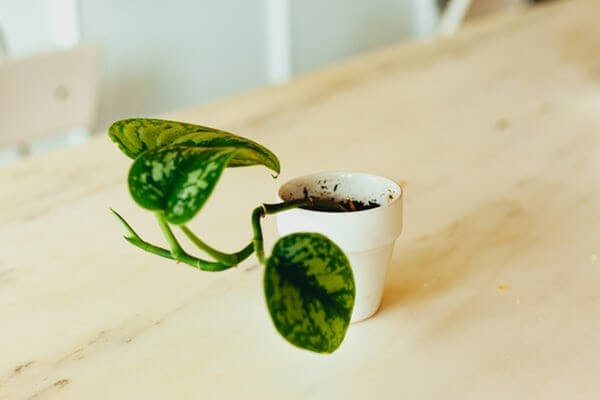
The golden Pothos blooms heart-shaped leaves, in a marble-esque pattern. The pothos doesn’t require too much water, so try to refrain from overwatering the plant, especially in a small bathroom where the moisture should be enough to keep it hydrated.
If you start to see yellow leaves, this is a good indicator that it has been overwatered. If this is the case, remove it from the bathroom and let it air out somewhere else in the home.
Additionally, pothos doesn’t do well under direct sunlight so avoid putting it on the windowsill. Because of the way it grows, however, it is a great hanging plant, and you can hang it from the ceiling or a high shelf where it’ll look stunning.
8. Bamboo

The notoriously fast-growing bamboo plant needs very little light to thrive and can grow in pebbles and water. If you do water it, we would recommend changing the water every two to four weeks, to keep the bamboo content. Bamboo grows quickly, so make sure you trim and prune when necessary!
We’ve only listed a handful of plants that would be a great addition to your small bathroom. Some plants flourish wonderfully in humid and low light conditions. Add a touch of nature to your bathroom, what are you waiting for?
If you’d like to choose your bathing option before deciding on plants to accompany it, view our wide range of walk-in baths and walk-in showers.

by mobilityplus | 30th Oct, 2019 | Inspiration

Caring for an older parent or relative can be an incredibly rewarding experience that brings you closer together. It can also be a very challenging experience in today’s busy, non-stop world.
Most carers are juggling family life, work and other commitments. This means they don’t always have time to fully be there for their older parents. In the UK, there are roughly 4.27 million carers who are also of working age. 1 in 5 carers has had to give up their job in order to care for a loved one. One thing that can really help both the old and young in this situation is technology.
How can technology help?
Voice recognition assistants and software, wearables, virtual services and even robots are all making things easier for the older population, helping them to live longer, more independent lives. This not only improves life for older people but can also make your responsibilities as a carer more manageable.
By staying more digitally connected to friends and family, older parents are also less likely to be affected by the growing loneliness problem faced by their demographic. In the UK alone, over 1.2 million older people are chronically lonely. This is as a result of living on their own and not being in contact with family and friends on a regular basis. Over 17% of older people are in touch with family and friends less than once a week while 11% are in contact less than monthly.
While grasping new technology may seem challenging for more senior members of society, teaching your parents how to use it could provide tremendous benefits. Just as there are a lot of things older parents can do for you, there’s a lot you can teach them, and that includes new technology.
Here are some new pieces of tech that could improve living for your older parent(s).
Online services
If mobility is an issue for your parent, then signing them up to an online platform that provides virtual checkups and appointments could be life-changing. These days, everything from doctor’s appointments to ordering transport and arranging deliveries can be done online, from the comfort of one’s home. Services like GP at hand and Push Doctor make doctors’ appointments accessible to those with limited mobility. Similarly, Simple Online Pharmacy can deliver prescriptions directly to their doorstep, eliminating the need for frequent trips to the local pharmacy.
Voice-activated software
Voice-activated software is a huge boon for older adults who no longer want to be fussing about with complicated remotes and confusing interfaces. A simple voice command can turn on the telly, even turn on the TV, lights even the coffee maker. Smart speakers like Amazon’s Echo Plus with Alexa built-in and the Google Home and assistant are leading the pack but many other solutions are coming on the market. The Wink Hub 2 is another great option if you want to integrate everything from your light switches to your kitchen appliances.
Robot companions
While the term ‘robot’ might read a little uncomfortable to some, there are many companies looking to harness the more positive aspects of AI and smart systems to help more vulnerable people. Some have even created smart companions that don’t look anything like ‘robots’ and have a more lifelike feel. The therapeutic Paro, an adorable fluffy seal helps those with dementia and even Hasbro has created artificially live cats and dogs that will keep you company. EllieQ is one of the latest to be developed that helps dispel feelings of loneliness.
Wearable tech
As we get older, keeping track of our health, especially (on a daily basis) becomes so much more important. Smart devices such as the Apple Watch and Fitbit can help an older parent keep tabs on their general health in a way that’s quantifiable and real. These devices make it easy to set goals like amounts of steps taken every day or number of glasses of water. Even quality of sleep can be tracked.
Personal alarms
If there’s one technology you should definitely look at investing in if you’re concerned about an older parent being on their own at home, it’s a personal alarm. With just a click of a button, your parent could get in touch with emergency services if they were ever in a critical situation. Companies like SureSafe and LifeLine24 offer these kinds of alarms and services. Most systems can be installed hassle-free and be integrated with their smartphone.
Further to this, here are some tips and tricks for helping older parents get used to new technologies.
Have patience
While this may go without saying, it can be easy to get impatient when teaching our older parents how to use technology. Tap here, swipe up, press this button – it’s not always as obvious to get on the first try as we think! Being patient will keep them coming back to you for more help and advice (instead of going to someone else).
Take it one step at a time
You may be tempted when teaching your parents about tech to load them up with tons of apps, features or to get them using shortcuts straight away. But doing too much all at once could be overwhelming. By focusing on one small thing at a time, they’ll gradually become more confident and adept with using new technology.
Consider what’s best for them (not you)
Remember, you and your parent(s) are likely very different. What works for you won’t always work for them. Instead of forcing them to use tech that you prefer, try seeing it from their point of view. Ask yourself what’s going to work for them rather than just for you. Also, ask yourself what they may be happier with.
Make instructions accessible
One of the easiest ways to teach your parents about new tech is to create a tutorial for them. This could be a video you upload to a private YouTube channel (you could even do a screencast for them) or something a little more familiar to them, like written instructions.
With these tips and tricks, your older parent should be off to a flying start when using their new tech. It might also open up a whole new world of things they could do while enjoying the peace of retirement.
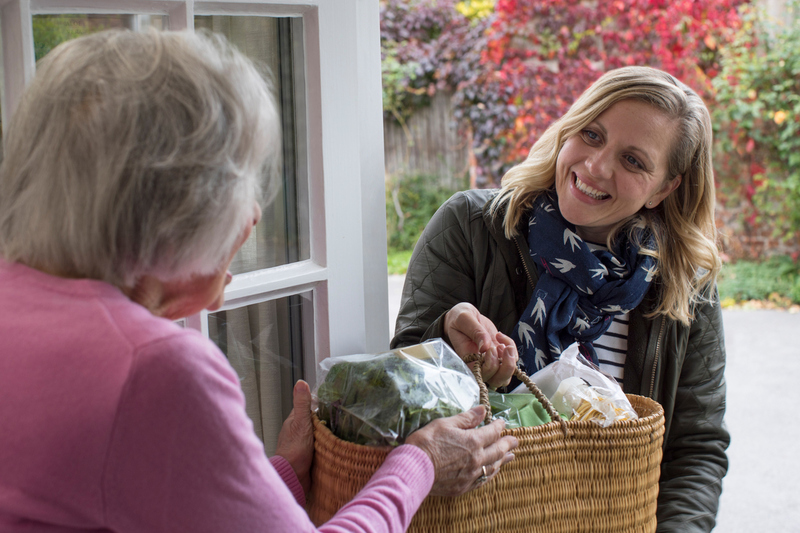
by mobilityplus | 30th Apr, 2019 | Inspiration
With the risk to your heart similar to years of smoking, isn’t it time we took more action to combat loneliness? We uncover how feeling alone can impact your health and why turning to your neighbours can help you to feel more connected.

Loneliness is an increasing problem with society today. And, it unfortunately, doesn’t get easier with age. Roughly one in five people in the UK feel lonely each day. With around one in ten adults having no close friends to talk to, it’s easy to feel isolated.
Whether you’ve moved to a new area, live alone, or your friends have passed away, feeling alone isn’t uncommon. As we get older, making new friends can seem like an impossible task. Yet, it isn’t as difficult as it may appear.
One way to make new friends and immerse yourself in your local community is to reach out to your neighbours. You’ll appreciate the opportunity to talk about your day, discover any updates in your local area, and create a comfortable safety net when you need it most. A small step outside of your comfort zone could have huge benefits for your health.
What causes loneliness?
Loneliness is a complex emotion that is unique to each individual as a direct response to feeling isolated. There isn’t one singular cause to loneliness, yet there are common factors that can trigger this unpleasantness.
How old you are, whether you live in a city or village and your overall health are contributing aspects that can influence loneliness.
As this low state of mind takes over, it can actually cause your health to get worse. Studies have shown that health problems such as heart disease and strokes can occur as a result of loneliness. With the feeling of isolation having a similar risk as smoking for heart disease, it’s time to act now.
Why can connecting with your neighbour’s help?
Moving home to a new area where you don’t know a lot of people or living alone makes it harder to connect with others during your day. Making new friends can feel next to impossible. It can be a daunting experience to join a new club or to spark a conversation with a stranger at the supermarket. Yet, the opportunity to make new friends could be easier and closer to home than you think.
Reaching out to your neighbours is just what you need. It’s a great chance to make new friends, whether it be speaking about your day or learning about the updates in your local community. And your mind will be grateful you did.
If you’re unsure on how to start the connection, why not take over a baked cake (or bought) or invite them around for a cup of tea one afternoon. They’ll appreciate you making the effort and your kind gesture will be rewarded in no time.
Your neighbours are in walking distance and are probably having the same feelings as you are. And you never know, it could spur a fluttering friendship.
What are the benefits of reaching out to your neighbours?
Connecting with your neighbours is a great first step towards building a happier and healthier life. With blossoming new friendships, you’ll have a great outlet of communication for everything that’s on your mind. And a connected society means you’ll grow a close-knit community and each help to combat loneliness.
How else can you meet new people?
Reaching out to your neighbours isn’t the only way to meet new people in your local area. You can join a sports club, start a new hobby or even sign up to an online project like the Campaign to End Loneliness.
Taking the first step is always the hardest part, but once you do, you’ll love the rewards. So, why not take a leap of faith today? Spark a conversation with your neighbours about their holiday plans, local delicacies or your hobbies. For more ways to connect with new people and give your life a renewed sense of purpose, you can read our article on a range of equipment to make your life easier here.
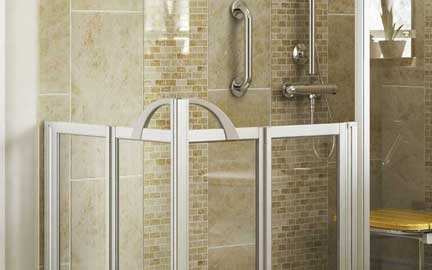
by mobilityplus | 21st Jan, 2019 | Inspiration
The bathroom can pose numerous challenges to anybody facing declining mobility. As one of the most dangerous rooms at home, safety is key for everyone. Discover our top tips on creating a mobility friendly bathroom by maximising your space.
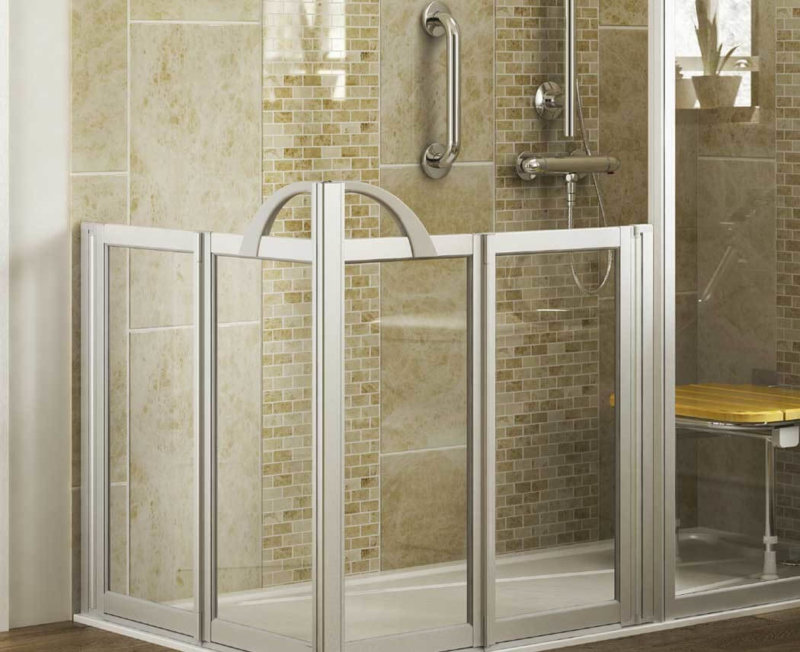
Consider a wet room
Wet rooms are a sensible and safety-first option that give easy access to everyone. They are – as the name suggests – easily accessible, with entry at ground level and with no shower door or tray, they are far less hazardous obstacles to think about.
The minimalistic design, including no unwieldy enclosures, makes this an ideal choice for small rooms. It will open up your space with simplicity and security. Forget impractical features; a wet room will ensure that high-quality design is met with safety, ideal for any individuals with reduced mobility or wheelchair users.
Request a Free Brochure
Simply fill out a quick form and see how we can transform the way you bathe.
Request Free Brochure
Discover different accessories
You don’t have to change your entire bathroom to enhance accessibility. There are accessories, from shower seats to shower systems, that will add additional safety features to your bathroom.
At Mobility Plus, there are different shower systems you can opt for – the Thermostatic Mixer Shower or the Electric Care Shower – that will conveniently enhance your bathing experience. These cleverly designed systems will give a consistent water temperature for the duration of your shower to help prevent scalding.
These accessory features are perfect for anyone with mobility issues as they encourage easy bathing and lower the risk of injury, whilst assuring independence to shower safely without the care of someone else.
Try a walk-in shower
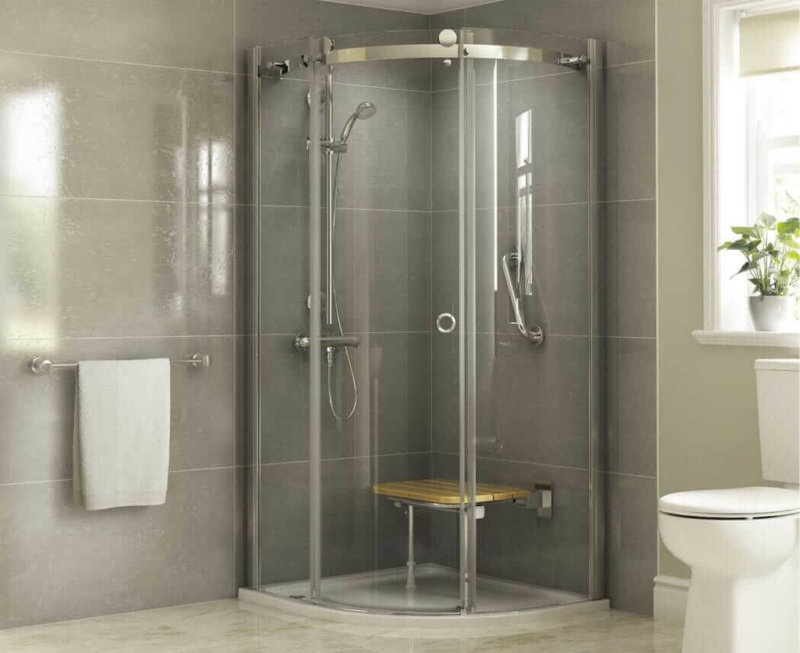
A convenient alternative to a standard shower, a walk-in shower combines comfort and easy-access with long-lasting durability. Our range of mobility bathrooms has the added bonus of being fitted with a fold away shower seat, for added ease and safety grab rails, for practical safety. If you have mobility issues, our range of walk-in showers means a shower no longer has to be a hassle. You can bathe with support and comfort to suit your needs.
So, whether you’re looking to improve safety for less mobile individuals or to future-proof your bathroom. With our special features, it also lowers the risk of falling; making a walk-in shower the ultimate choice to instil your bathing experience with confidence.
What’s more, they are a savvy solution when looking to maximise smaller spaces: they can fit into an awkward corner to provide a better bathing experience for everyone. The practical aspect of walk-in showers allows for more passage space for mobility aids.
Updating your bathroom to suit anyone with mobility issues doesn’t have to be a hassle. If you’re looking for a long-term investment for your future, then switching to a walk-in shower, for example, could be the perfect choice for all the family. Yet, for a budget-friendly alternative, there are numerous accessory features you could include in your bathroom that require little effort and have huge benefits.
For more information on how to make your bathroom experience more comfortable, discover our guide on the best bathroom accessories to ease your bathing.
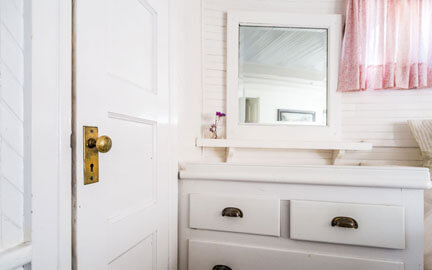
by mobilityplus | 7th Nov, 2018 | Inspiration
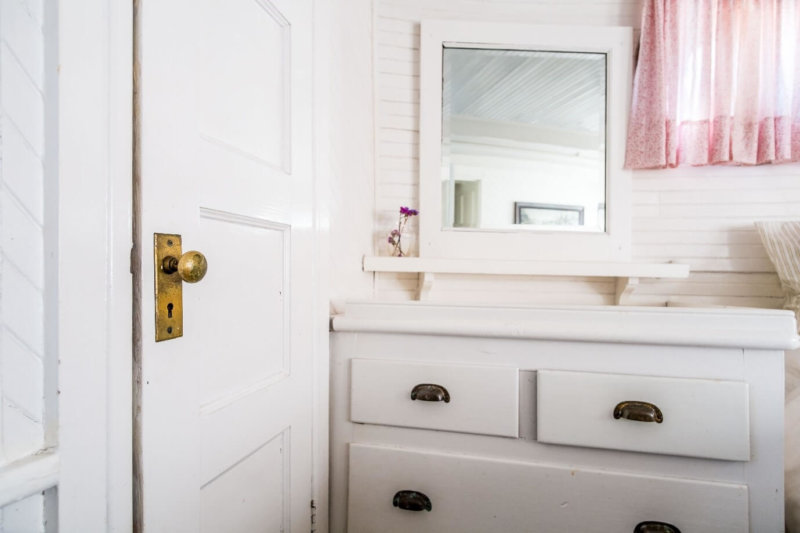
The UK has some of the smallest homes in Europe. Even in countries with dense populations – like the Netherlands and Germany – people tend to have more floor space than we do.
So, what does this mean for your bathroom? Well, the incentive to find space-saving solutions doubles. This is particularly true if your mobility needs have changed, or are likely to change in the future, and you need a little more room to get around.
At Mobility Plus, we’re always looking for ways to make small spaces more comfortable. Here are some of our best ideas.
Plumbing pipes
Plumbing pipe connectors can take up unnecessary space if they’re not gathered together in one place in the bathroom. They can also increase the risk of tripping.
Consult a plumber or bathroom installer to find out where your pipes are, if you’re unsure, and ask if they can be connected to create one single drainage system to save space. A small space gain may not be worth the money, but you won’t know until you ask.
Smart storage
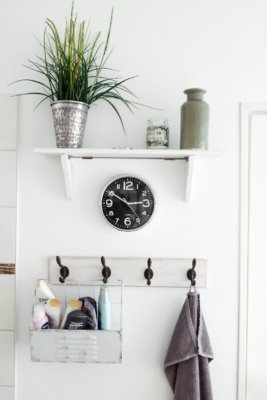
Keeping your bathroom neat and organised will also help free up space. Tidy away towels and hair and body products by adding under sink storage or attaching a cupboard to the wall.
Or, if space is too limited for built-in storage, a simple row of hooks can make all the difference. You could even hang a couple of hanging organisers off them, storing toiletries and other small items in the pockets. These can be put on the back of the door, inside a closet or on the wall.
Walk-in showers
It may seem counterintuitive to describe a walk-in shower as space-saving, but our Kendal design has just a single panel shower frame, creating more open space to dry and dress yourself in. It will also let more light into the shower. The fold-down seat can be packed away when not being used, helping the whole bathroom feel more spacious.
Essential for checking your appearance, mirrors can also help a small bathroom appear larger. They not only give the illusion of depth, but reflect both natural and artificial light, making a room brighter during the day and night. Go for an unframed, wall-to-wall mirror to maximise the effect.
Mirrors
Essential for checking your appearance, mirrors can also help a small bathroom appear larger. They not only give the illusion of depth, but reflect both natural and artificial light, making a room brighter during the day and night. Go for an unframed, wall-to-wall mirror to maximise the effect.
Walk-in baths
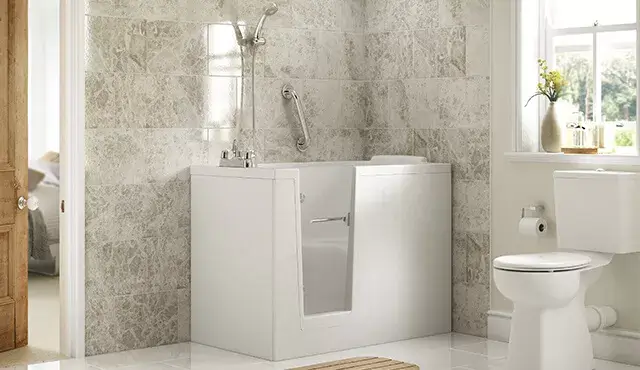
A walk-in bath often saves on floor space because most designs – like our Hampton Elite modern walk-in bath – are twice as high and half as long as a standard bath. This frees up room around the bath, making it even easier to get in and out.
The comfortable built-in seat makes bathing more comfortable and safe. You can also choose to add our chromotherapy light system, which promotes balance and healing, or our hydrotherapy spa system, which is known to soothe aches and pains in muscles and joints.
If your bathroom is small, we hope we’ve given you some practical ideas about how to save floor space, while creating the illusion of greater light and room. Feel free to call one of our advisers if you’d like further advice.





















